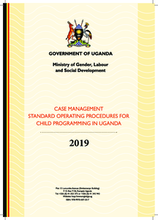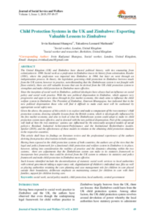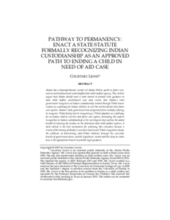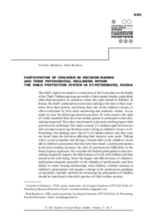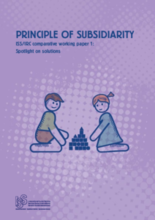Displaying 411 - 420 of 1759
This paper explores the leaving care policies of the Australian state of Victoria, and the reasons for policy "inaction" on providing post-care support to youth leaving care until the age of at least 21 years old.
This harmonised Case Management (CM) toolkit includes standard operating procedures describing how each step of the CM process should be implemented, tools or forms that should be used for CM, and additional guidance that must be taken into account by actors involved in CM.
This article shall base its findings on literature review and the professional experiences of the authors deriving from practice observations of the child protection systems in the UK and Zimbabwe.
This volume provides readers around the globe with a focused and comprehensive examination of how to prevent and respond to child maltreatment using evidence-informed public health approaches and programs that meet the needs of vulnerable children, and struggling families and communities. Detailed guidance is provided about how to re-think earlier intervention strategies, and establish stronger and more effective programs and services that prevent maltreatment at the population level.
This article argues that the US state of Alaska should enact a state statute to provide clear guidance to state child welfare practitioners and state courts that Alaska’s state government recognizes an Indian custodianship created through Tribal law or custom as a pathway for Indian children to exit the overburdened state foster care system.
This study raised the following research questions: To what extent is the right of a child separated from his or her natural parents to participate in decisionmaking respected? How does involvement in decision-making impact their psychosocial wellbeing?
This article explores the inheritance rights of Indonesian citizens adopted by foreign nationals in terms of Indonesian inheritance law.
The Routledge Handbook of Critical Social Work brings together the world’s leading scholars in the field to provide a cutting-edge overview of classic and current research and future trends in the subject.
The aim of this article is to develop proposals for the organization of a legal and regulatory framework in Russia, in accordance with the social and psychological needs of guardianship families and to identify the possibilities of the Ombudsman for the Rights of the Child to protect the rights of minors raised in guardianship families.
Having the best interest principle and taking into account the individual needs of each child in intercountry adoptions, this paper endeavours to promote the two tier approach of the principle of subsidiarity by examining the drafting spirit behind international standards (Section 1), providing examples of legislation and jurisprudence (Section 2) and identifying promising practices (Section 3) that reflect the principle.

